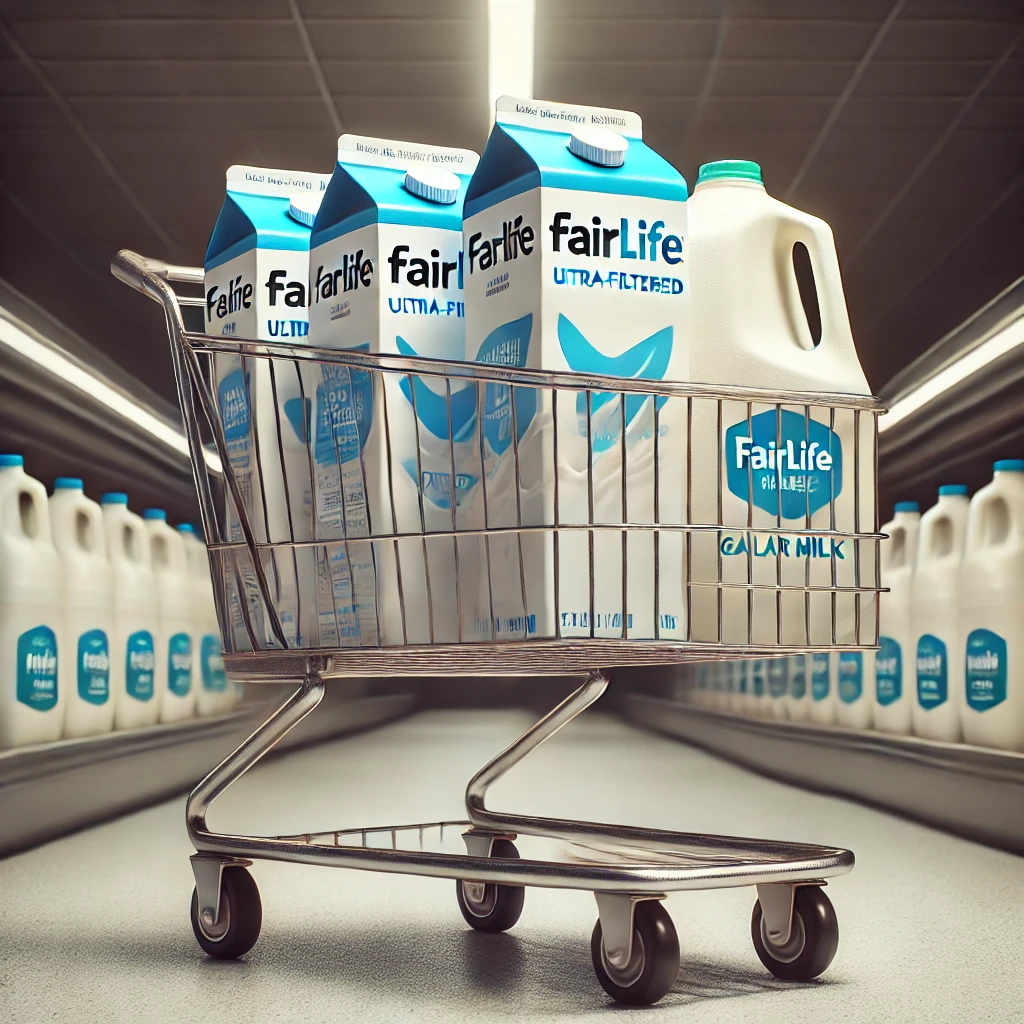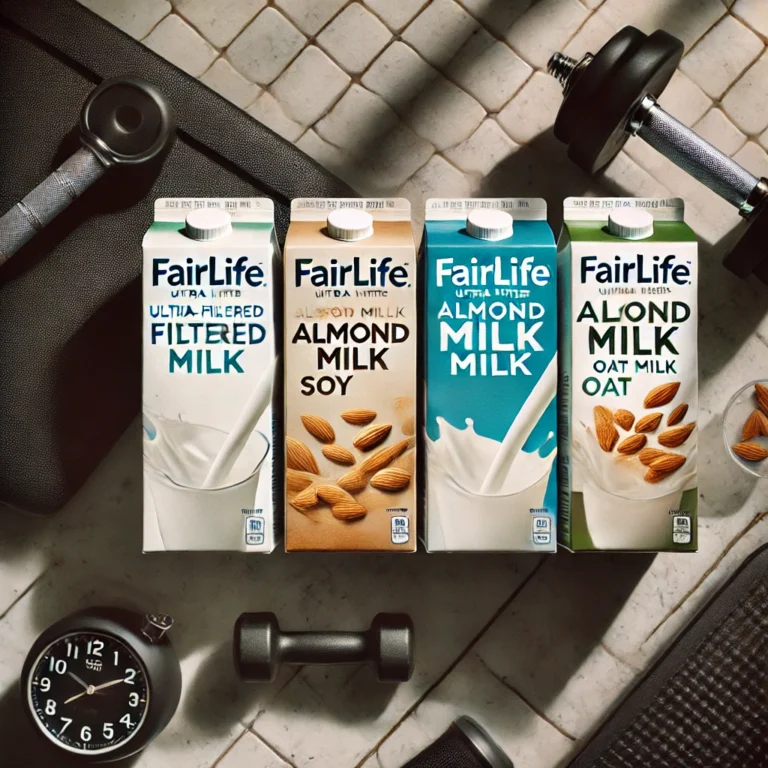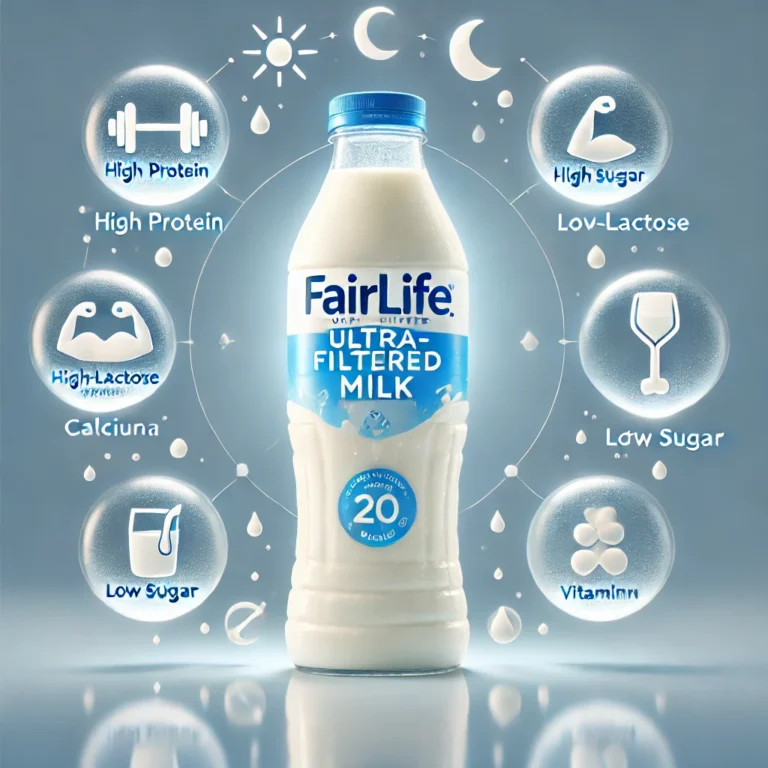
Fairlife vs. Regular Milk: Striking the right balance between cost and nutrition.
Introduction: Choosing the Best Milk for Your Fitness Goals
For fitness enthusiasts, milk is more than just a protein source—it’s a budget-conscious nutritional tool with options to suit different dietary needs and goals. When selecting the right milk, factors like cost per gram of protein, digestibility, and nutrient density come into play. This guide breaks down the cost and protein efficiency of Fairlife Ultra-Filtered Milk versus regular milk (whole and skim), helping you align your choice with your fitness priorities and budget.
1. Cost and Protein Comparison: Fairlife vs. Regular Milk
Here’s a snapshot of the price, protein content, and cost per gram of protein for each milk type, based on commonly available prices:
| Milk Type | Price per Liter | Protein per Liter | Cost per Gram of Protein |
|---|---|---|---|
| Fairlife Ultra-Filtered | $4.88 (1.5L) | 81g (13g per cup) | ~$0.06 |
| Whole Milk | $3.79 (1 gallon) | 32g (8g per cup) | ~$0.04 |
| Skim Milk | $3.49 (1 gallon) | 32g (8g per cup) | ~$0.04 |
Quick Analysis
Fairlife offers about 50% more protein per serving than regular milk and is lactose-free, which benefits those with lactose sensitivities. However, its higher price reflects its specialized filtration process, which increases protein concentration and essential nutrients like calcium and vitamin D【139】【140】.
Pro Tip: For those prioritizing high protein and lactose-free options, Fairlife’s extra cost may be worth it. If you’re focused on calorie intake or are budget-conscious, whole or skim milk may better serve your goals.
2. Protein Efficiency and Practical Value for Recovery
Protein Absorption Advantage
Milk proteins, especially those in Fairlife, are highly bioavailable, meaning they’re efficiently absorbed and utilized for muscle recovery. Whey (fast-digesting) and casein (slow-digesting) proteins in milk provide balanced recovery benefits beyond single-protein sources【137】【140】.
Scientific Insight: Studies show that combining whey and casein proteins supports superior muscle recovery compared to carbohydrate-only recovery drinks.
Carbohydrates for Glycogen Recovery
Milk also contains lactose, a natural carbohydrate that helps replenish glycogen stores after exercise, benefiting endurance athletes who need to restore energy quickly post-training【140】.
Bottom Line: For those needing concentrated protein with fewer calories, Fairlife offers a digestible, high-protein option. Regular milk provides balanced protein and carbohydrates for glycogen and muscle repair, all at a more affordable rate.
3. Daily Milk Consumption: Half-Gallon vs. Gallon
Below is an estimated breakdown of calories and protein for different daily intake levels with each milk type:
| Intake Volume | Fairlife (Ultra-Filtered) | Whole Milk | Skim Milk |
|---|---|---|---|
| Half-Gallon | 960 calories, 104g protein | 1,200 calories, 64g protein | 640 calories, 64g protein |
| Full Gallon | 1,920 calories, 208g protein | 2,400 calories, 128g protein | 1,280 calories, 128g protein |
Quick Strategy
For lean muscle gains or calorie-conscious diets, Fairlife’s higher protein concentration makes it efficient. For bulking, whole or skim milk offers a cost-effective way to increase daily calories and protein.
Example Strategy: For those bulking, whole milk helps meet high-calorie needs affordably. For lean gains, Fairlife offers more protein per calorie, supporting lower calorie consumption while hitting protein goals.
4. Savings Tips: Bulk Purchases and Subscription Plans
Maximizing Savings
Fairlife’s higher cost per liter can be reduced with bulk purchases or subscription plans from major retailers, helping stretch your fitness budget.
Savings Tip for Regular Milk: Standard milk options are typically available at lower prices at local dairies or discount stores, offering a more budget-friendly alternative for those without lactose sensitivities or specialized protein requirements.
5. Research Insights: Milk’s Impact on Performance and Recovery
Scientific research shows that milk is a powerful recovery beverage, often outperforming carb-based recovery drinks. For instance, Cockburn et al. found that 500 ml of low-fat milk post-exercise limited muscle function loss up to 48 hours later compared to a placebo【140】. The combination of whey and casein proteins in milk enhances both muscle repair and endurance, outperforming single-protein sources like whey alone【138】【139】.
Quick Fact: Chocolate milk’s 3:1 carb-to-protein ratio makes it a competitive post-workout option, supporting glycogen replenishment and muscle repair.
Conclusion: Balancing Cost with Nutrition
For athletes prioritizing high protein, low-sugar options, Fairlife Ultra-Filtered Milk delivers concentrated benefits, albeit at a higher price. Meanwhile, whole and skim milk remain reliable, budget-friendly options for daily protein and calorie needs, especially for those in a bulking phase. The best choice depends on your individual fitness goals, dietary needs, and budget.
Curious about other milk types for fitness? Explore our complete guide on Milk and Fitness – A Complete Guide to Nutrition and Gains.
FAQ: Common Questions on Milk for Fitness
Q: Is Fairlife worth the price for fitness goals?
Fairlife’s higher protein concentration and lactose-free profile make it ideal for lean gains or those needing an ultra-filtered, lactose-free option.
Q: How much milk should I drink daily for muscle gain?
A half-gallon of whole milk provides around 64g of protein, which is a good start for muscle gain. Adjust intake based on calorie and protein needs.
Q: Can regular milk meet my recovery needs?
Yes, regular milk offers both whey and casein, supporting muscle repair and glycogen replenishment at a lower cost than specialized options like Fairlife.
Internal Sources
- Milk and Fitness – A Complete Guide to Nutrition and Gains
Explore the role of milk in fitness, from bulking to recovery. - Fairlife Ultra-Filtered Milk for Muscle Recovery
Learn about the unique recovery benefits of Fairlife for athletes. - Lactose-Free Milk for Fitness
Check out lactose-free milk options for fitness and muscle recovery. - Casein vs. Whey in Milk
Learn how milk’s proteins, casein and whey, support muscle growth and recovery.
Sources
- International Society of Sports Nutrition: Protein Timing and Recovery【139】
- Nutritionix: Fairlife Milk【83】【85】
- MilkGenomics: Milk and Muscle Recovery【140】
Final Call-to-Action
Share your experience! Whether you’re using Fairlife for lean gains or classic milk options for bulking, let us know what works best for you. Find more insights on fitness and nutrition at Paranoid Prophet!


